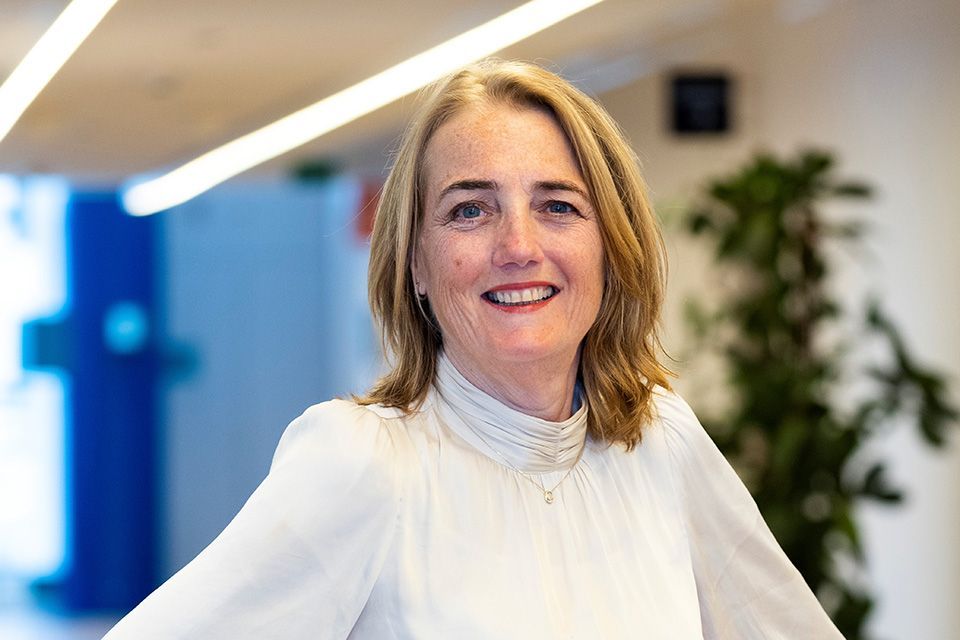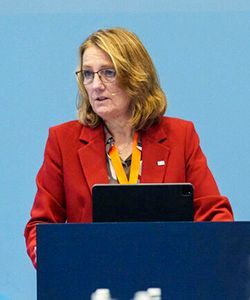Conferences
‘Digital care requires European collaboration’

“Without cooperation, an unprecedented healthcare crisis threatens,” stresses Bianca Rouwenhorst. She believes data exchange is the key to keeping healthcare accessible, affordable, and humane. “We must take responsibility because we can only make a difference together,” she says.
The healthcare sector is facing major challenges due to the ageing population and the growing staff shortage. The demand for care is increasing, while the number of available healthcare professionals is lagging behind. To keep proper healthcare accessible and affordable, the policy’s main focus is on improving data exchange and data availability. Less administration lets healthcare workers spend more time with their patients, which increases the quality of care and ensures more job satisfaction among professionals.
Bianca Rouwenhorst, Director of Information Policy and Chief Information Officer at the Dutch Ministry of Health, Welfare and Sport, outlines this problem in her keynote address at the ICT&health World Conference 2025 in Maastricht. As a fervent advocate of e-health, she believes data exchange is the way to improve healthcare processes.
Bianca Rouwenhorst is the Director of Information Policy and Chief Information Officer at the Ministry of Health, Welfare and Sport (VWS). From this position, she leads the digital transformation of the Dutch healthcare sector. She is a fervent advocate of e-health and sees technology as the way to improve healthcare processes. She does this by focusing on both technological progress and human interaction. Rouwenhorst often speaks at conferences, where she encourages parties in healthcare to work together and think beyond their interests.
“Around the world, we’re dealing with a growing and aging population, each country in its own way. It results in increasingly complex care needs, with more people suffering from more than one chronic disease,” she says on stage at the MECC Maastricht. “At the same time, we have fewer dedicated and well-trained healthcare professionals to provide this care.
Today, one in seven people work in healthcare. If we do nothing, this will have to be one in four people by 2040. It will be an unprecedented crisis, with worse health outcomes as a result.”
With these challenges in mind, how do we shift from disease care to healthcare, how do we prevent people from getting sick, how do we keep healthcare accessible to those who need it, how do we use science to get better treatments faster, and how do we use technology and data to innovate and provide care to everyone?”
A huge task
“At a conference earlier this year, I heard a mother, Laura, talking about caring for her son with epilepsy. She showed us in a simple system how many care providers are involved in caring for her child: the GP, the community nurse, the pharmacist, the hospital, the neurologist, the occupational therapist, the physiotherapist, and so on and so forth.
About 15 people stood on stage to represent the healthcare providers she deals with on a daily basis. Each of them has a small part of her son’s medical information, and none of them has the whole picture with all the necessary data.
The mother must log in to as many patient systems as there are healthcare providers treating her son
The mother has to log in to as many patient systems as there are healthcare providers treating her son. And she has to keep track of all that data and combine it herself to get the whole picture. She has to communicate with the healthcare providers to prevent them from prescribing counterproductive treatments and medications.
Such practical examples show the importance of reorganising our healthcare system. This perfectly illustrates why I have a mission to create future-proof healthcare. Healthcare for everyone, including our children and grandchildren and future generations.
This is a huge task for everyone, not just for me: patients, professionals, carers, policymakers, researchers, innovators, governments, and financiers. We all have our part to play, and I count on all of them to take responsibility.”
Collaborating in Europe
“It will be impossible to transition without collaborating. If we all continue to work in our own way, we will never be able to share data across borders. It limits the future-proof healthcare for our citizens who work, travel, and live all over the world. In today’s world, we need to develop solutions and innovations that are internationally exchangeable and applicable.
Research can also be provided with more data from more patients from more countries, so that more personalised treatments can be found for patients in Europe and abroad. I always challenge countries at conferences to openly share good ideas with each other and maybe even steal from each other.”
The importance of conferences
Vivienne Scheltema is the coordinator of the Communications Team at the Information Policy Directorate of the Ministry of Health, Welfare and Sport (VWS). Together with her team, she is responsible for participating in and organising conferences. Her team supports CIO Bianca Rouwenhorst and advises her on her participation in conferences. Conference Matters spoke to Rouwenhorst about the importance of conferences as a means of communication.
Do you use conferences to spread the Ministry’s message?
“Yes, it’s an important part of our communication approach. Based on our task to achieve proper data exchange and data availability in healthcare, we work with the Information Policy department at many major events, such as the Zorg&ict event of Koninklijke Jaarbeurs in April and the ICT&health World Conference, which usually takes place in January. We focus on it because our target groups are also at these events.”
How do you participate?
“Our communication strategy determines how we are in contact with our target groups and stakeholders. We always look at who from our organisation can best act as a speaker; that depends very much on who the target group is. One time our director is the keynote speaker, and the next time, a policy-related colleague who knows a lot about a subject.
At big events we often do both, with a main speaker on the main stage and more policy-related colleagues in the breakout session.”
Is there enough sharing at these conferences between the various parties involved, such as healthcare providers, technology companies, governments, and patient organisations?
“Yes, evaluations show that our participation in these conferences are seen as positive. However, it’s true that these conference take place alongside many other forms of consultation and cooperation. To be fair, that’s where the real exchange takes place. There is too little time for that at the events, although we always organise in-depth sessions at the events.”
How important is it to consult internationally?
“Many of the rules and legislation are European, such as European Health Data Space (EHDS). Many of the guidelines and standards that data exchange must comply with are international, so here as well, there’s a lot of consultation and cooperation between many countries.”
Carrousel
Deel dit bericht
Reacties
Er zijn nog geen reacties.
Plaats een reactie
Je moet ingelogd zijn om een reactie te plaatsen.

